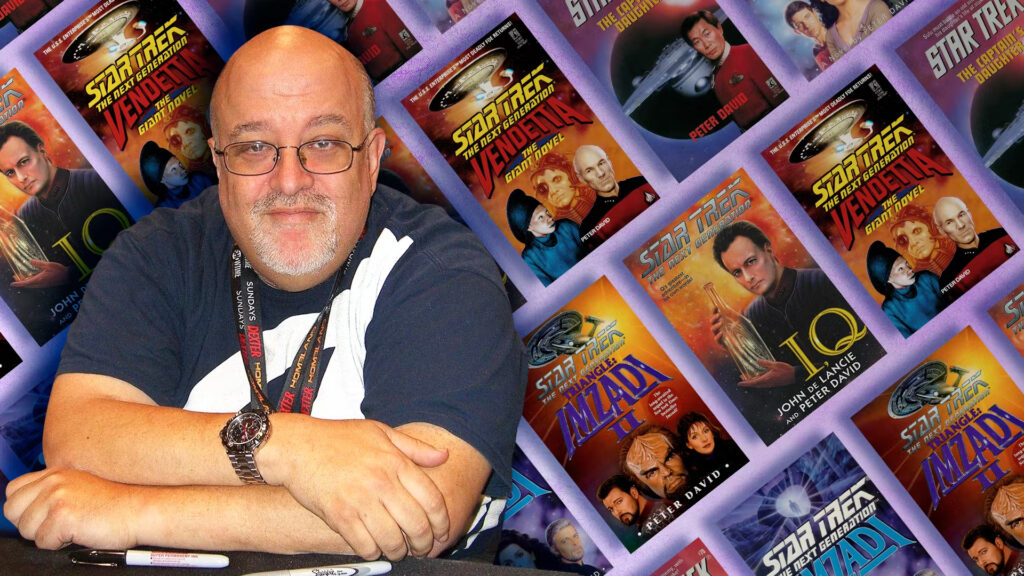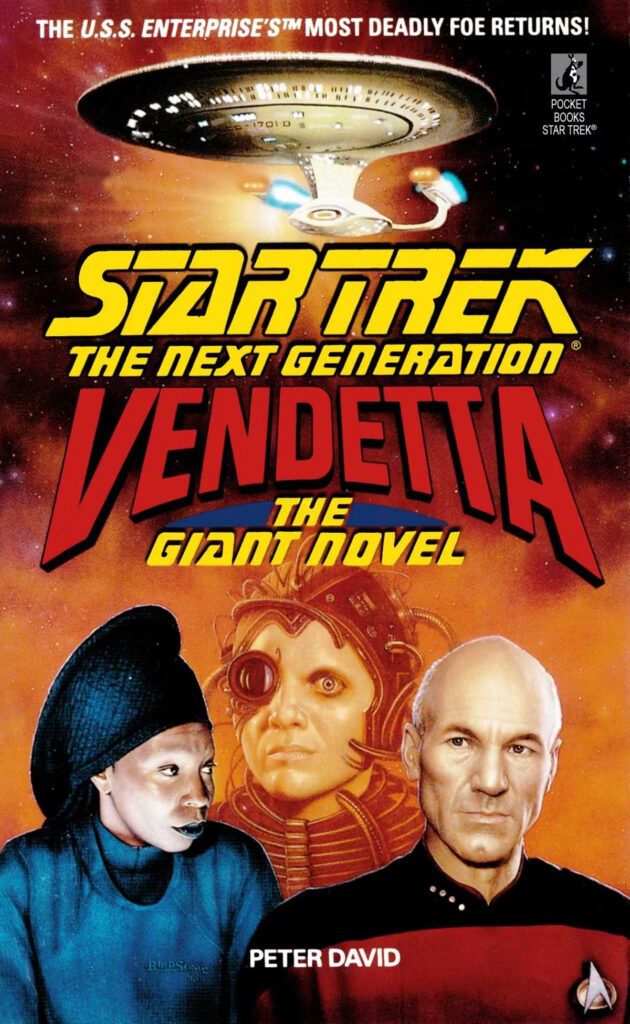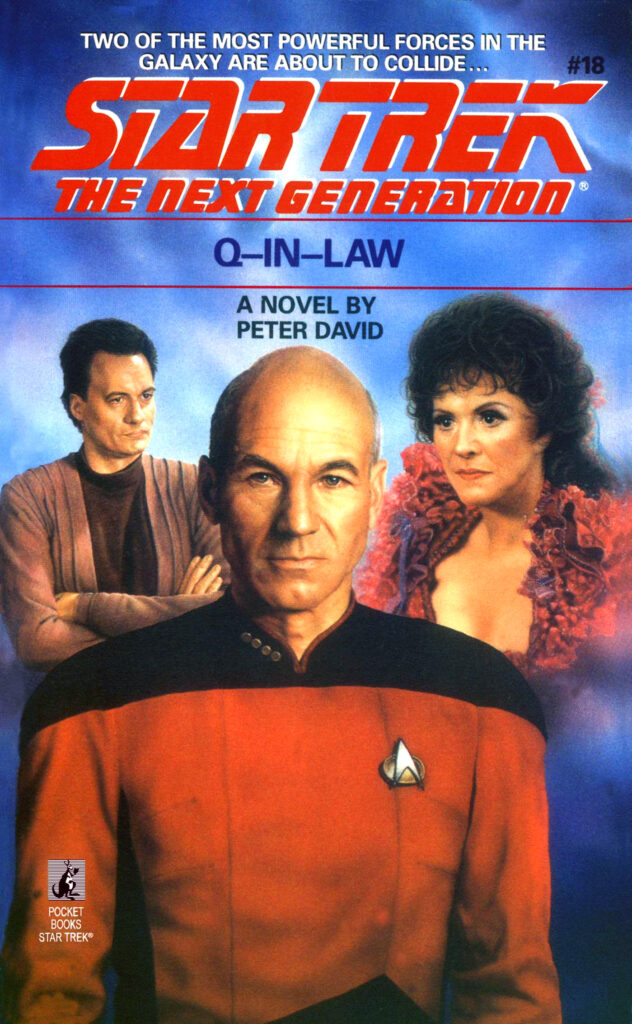“Dammit, Peter, you write faster than I can read!!!” I wasn’t exaggerating back in 1992 when I said that to PETER DAVID, sitting across from him at a table in Goldberg’s Pizza on 2nd Avenue and 53rd street in New York City.
Peter was one of those famous people that I “almost” knew well. Back in those days before I moved from Manhattan to Los Angeles, I used to occasionally hang out with a couple Star Trek novel and comic book authors whom I’d met thanks to knowing DC Comics editor BOB GREENBERGER. Peter was one of the writers of the Star Trek comic book series (an excellent run!), and he, Bob, and Trek novelist MICHAEL JAN FRIEDMAN were a triumvirate of sorts in the early 1990s and collaborated on multiple Star Trek novels. Peter himself wrote nearly FIFTY Trek novels…including 3 TOS-era, 11 TNG novels, two DS9s, three TNG: Starfleet Academy novels, 2 Mirror Universe, and a whopping 27 of the popular New Frontier series of novels.
And that was just Star Trek! Peter also wrote five Babylon 5 novels and adaptations, a Battlestar Galactica novel, an Alienation novel, a ridiculous number of comic books for Marvel and DC (including my personal favorite “Mr. Fix-It” run in The Incredible Hulk), TV scripts, video games, and—oh, heck—just read the whole frickin’ list on Wikipedia! And that doesn’t even include the countless brilliantly insightful editorials and essays he penned in his regular But I Digress column in the Comic Buyers Guide. Indeed, if you want to hear about Peter’s life in his own words, read his memoir of amazingly true and truly amazing stories: Mr. Sulu Grabbed My Ass, and Other Highlights from a Life in Comics, Novels, Television, Films and Video Games.
Because this is a tribute blog, I want to share a few of Peter David’s stories that may or may not have made it into the public consciousness but were shared with me personally. (They actually might be in one of his memoirs, but I will sheepishly admit that I haven’t read them yet.) And since this is a Star Trek-themed blog, I’ll leave out the superhero-based stories…although there’s a hilarious one where Peter was sitting briefly at BILL SIENKIEWICZ’s table at a comic book convention, pretended to be Bill when a fan came over to ask for his autograph, and then proceeded to convince the fan that the named of the character of Moon Knight was properly pronounced “moon ken-NIG-it.”
Are you ready for some other Peter David stories?
One of my favorites is from the very early 90s when Peter’s oldest daughter Shana was only about five. One of Shana’s favorite things to do was watch Star Trek with Daddy, sitting with him on the couch or on the floor by his feet, knowing that this fun show was part of what her father did as his job…although maybe not yet understanding exactly what.
One day, Peter was viewing a VHS tape of Star Trek II: The Wrath of Khan to research something, and Shana came over to join him. After a few minutes, she asked him what it was he was watching. “This is Star Trek, honey,” he said. “Oh, she replied.” She continued watching with him, but a few minutes later, she turned around and, with a completely confused look on her face said, “Daddy…where’s Worf?”
Talk about the next generation! Of course, younger readers of this blog won’t laugh at that, but for anyone born prior to 1975, that story is hilarious! However, if you want stories that will be funny to all fans (or most, hopefully), let me tell you a little about Peter’s relationship with RICHARD ARNOLD.
Every hero needs a villain, and for Peter, that was GENE RODDENBERRY’s personal assistant, Richard Arnold. Of course, Richard would agree with that statement 100%—as long as he (Richard) was the hero and Peter David the villain. But I’ll let you be the judge.
Richard was a research consultant on Star Trek: The Next Generation, holding the title of “Star Trek Archivist” from late 1986 and being tasked with vetting proposals and final manuscripts for licensed tie-ins (novels, comics, guidebooks, video cover art, etc.). And because Peter David was writing multiple Star Trek novels and comic book stories, this meant a lot of interaction between the two men…albeit indirectly.
Peter never quite knew if one, specific catalyst earned him Richard’s ire and revulsion, but it seemed that nothing was ever good enough to be approved without drastic, frustrating, petty, and sometimes devastating (to story quality) change demands. In fact, Peter himself was eventually left with no choice but to step away from the DC Comics Star Trek series in 1991 because he felt his very presence combined with the antagonism from Richard Arnold was making the comic book suffer. In Peter’s own words…
“The fact is that Richard Arnold’s notes became increasingly ludicrous, such as shutting down a romantic interest for Kirk by asserting that Kirk was no longer interested in women. We were reaching the point where it was becoming impossible to get stories approved. Richard rejected one story with the assertion that there was ‘too much violence’ even though the violence consisted of a sustained fist fight scene with Kirk (as if they never had those in Trek).
As a test, I submitted a script under a fake name which sailed through the approvals process even though it had far more violence than the previous script which was rejected for that reason. When that was approved, I knew that it had nothing to do with the stories and everything to do with Richard’s enmity toward me (a far longer story to go into). At which point I resigned from the book since I felt I could no longer do the job I was hired to do, namely provide stories for DC. Final kicker: The fake name under which I submitted the story that was approved? ‘Robert Bruce Banner’.“
Novel manuscripts came back with even more change demands. And here are where my two favorite Peter David stories come in. Peter didn’t want to step away from Star Trek novel writing because, frankly, it paid far better than his work on a single comic book series. In the late 80s and early 90s, Star Trek novels were almost guaranteed to spend a week or more on the New York Times Bestseller list. But when nearly every chapter you hand in for review is filled with dozens of red-circled and X’d-out passages when the publisher hands it back to you, the sheer hassle of rewriting becomes almost intolerable and unmanageable. But by 1990, Peter was nothing if not devilishly clever and borderline impish in his desire to make Richard Arnold’s life as miserable as possible.
So Peter decided to flood the zone. Instead of trying to be extra-careful not to write anything that would possibly offend Richard and earn his crimson-penned wrath, Peter went in the other direction and threw in everything including the kitchen sink. Peter’s reasoning: even if Richard finds 70% or 80% of the things I want to include and nixes them, that’s still 20% or 30% of stuff I can get past him!
Peter had no idea what was going through Richard’s head when he started reading passages like “Jean-Luc Picard ran his hand through his long, wavy hair…” (this was later revealed to be a flashback to Picard’s time on the Stargazer), but apparently Richard came up with a rather clever and sinister strategy of his own to defeat his arch-nemesis. Richard would simply not review the manuscript at all! No review, no approval…easy-peasy.
Oh course, Richard’s job was to review submitted manuscripts. But hey, stuff happens, right? People get busy. Eventually, Richard was told by the editor at Pocket Books that he had until the following Monday to provide his notes and feedback. “I’ll try, but no promises,” he replied (or something similar), and when Monday arrived, no feedback came in from the person at the studio assigned to review Star Trek novel manuscripts.
Richard probably thought this was game, set, and match, and that Peter David’s latest book would now be canceled because there was no approval from the studio. Tough luck, Peter! Maybe next time—if there is a next time!—you’ll fall in line. However, that’s not the way it works in the industry. Manuscript review is a courtesy, not a right. When a company like a book publisher purchases a license, they are also purchasing a service, of sorts. And that service is guidance from the licensor—through reviews of, and feedback on, their submissions in a timely fashion. There is a realistic business expectation that the studio will hold up its end of the agreement while the licensee holds up theirs. And indeed, the licensing contract even provides for that. Because a book publisher has certain commitments to sales reps, printers, distributors, and bookstores that are time sensitive, if the studio fails to deliver its feedback before an agreed-upon deadline, the submission is automatically considered to be approved.
Sucked to be Richard Arnold that day.
Vendetta, the first giant-sized TNG novel, went to print with ALL of Peter’s many, many pushings-of-the-envelope. Peter threw in everything including the kitchen sink, and everything including the kitchen sink was now approved! The only thing Richard could do was force a disclaimer into the novel saying it was not to be considered official canon. Yeah, nice one…Dick! It didn’t matter, though, as fans loved the new book, it sold amazingly well, and Peter’s reputation as a wildly popular Star Trek novel writer was cemented.
The final Peter David story again involves Richard Arnold, shortly before Gene Roddenberry’s passing in October of 1991. Gene’s death resulted in Richard’s prompt removal from the Paramount lot at warp speed, but that hadn’t happened when Peter was still working on his next TNG novel, Q-in-Law…featuring what Peter called the two most powerful entities in the Star Trek universe: Q and Lwaxana Troi.
Richard now understood that he couldn’t avoid reviewing these manuscripts from Peter, so he began marking things up sixteen ways till Sunday. What Peter got back from the Pocket Books editor he described to me over a deep-dish style pizza as “…black and white and red all over!” It was going to be nearly impossible to make all of those changes in the short amount of time he had before the book deadline, and even his editor was worried. But Peter had a plan…or rather, an opportunity.
By this point, Gene was ill enough that he no longer made it to conventions. But MAJEL BARRETT RODDENBERRY was still on the convention circuit, and she and Peter were scheduled to be at the same con during the same weekend. On Sunday, Peter waited until he saw Majel head into the green room, a special lounge reserved for con guests to relax and get refreshments. Peter followed her in, sat down next to her, and offered to get her a drink or a snack so she wouldn’t need to get up. “Oh, that’s so considerate, thank you,” she said, and Peter brought her a Diet Coke or something.
When he sat down, he introduced himself. “Majel, my name is Peter David, and I’ve written a few Star Trek novels.”
“Oh, that’s very interesting,” she said…although it probably wasn’t.
“Mrs. Roddenberry, please forgive me if I’m being too forward here, but I was really hoping you could help me with something very important.”
This got Majel’s attention. “What do you need my help with?”
“Well, I’ve written a manuscript for a novel featuring Lwaxana Trio, one of my favorite characters, and Q, and…well, um…”
“Yes?”
“Well, it’s kind of embarrassing for a writer to admit, but I’m getting a lot change requests back from the studio. And I’m trying to make them all, but it’s hard to figure out exactly what will make them happy, especially when it comes to Lwaxana. I know it’s a big ask, but I was wondering if you’d be willing to read some of the manuscript—I have a copy with me—and offer me some guidance on how to write your character the correctly. I mean, no one knows Lwaxana Troi better than you, right?”
“Of course, I’ll read it over. I’ll take it back on the plane with me. Let me put it into my bag right now.”
The next morning, the licensing representative at the studio called the Pocket Books editor directly. The manuscript for Q-in-Law was approved as submitted, no changes required.
I know these last few years weren’t easy for Peter, as his health was failing, and he wasn’t able to do what he loved most—write—nearly as much as he used to. But that doesn’t diminish the incredible volume and quality of the work that he did produce over a 68-year lifetime. And I, along with many others, will be feeling a Peter David-sized hole in our lives right now knowing that the world no longer has him as walking/talking/writing/laughing part of it.
Farewell, Peter.




Peter was my favorite Star Trek novelists.
If I am remembering correctly, I saw him speak at ICON at SUNY Stony Brook. The discussion when to having written material reviewed. He said that editors like to change the text. So, he put stuff in for them to take out. One book went to the editor and the editor was too far behind. He said it was published with the Picard bald jokes intact.
He also recommended that we get “A Martian Wouldn’t Say That”. It was a collection of executive complaints about TV shows.
https://archive.org/details/martianwouldntsa0000unse
Sounds like Peter was talking about “Vendetta.” 😉
BTW, the funniest panel I ever saw was at ICON: Stan Lee, Julius Schwartz, and Harlan Ellison. I called it “Three Live Jews” and it had the audience gasping for breath between uproarious laughter.
The story about Majel is very sweet. I read Peter’s novels as a kid. He was my favorite Trek Author.
Majel was a force of nature. Peter knew that. 🙂
Approaching her with humility was his ace in the hole. Richard Arnold was anything but humble, and I suspect Majel knew that. He’d been Gene’s personal assistant since the mid-80’s, but it’s hard to hide ego. I am certain Majel was well aware that Richard was being a roadblock. But after reading an entire novel about her character that was as well-written and hilarious as Peter could write it, Richard Arnold didn’t stand a chance.
I would never delight in someone getting fired, but the fact Richard Arnold was fired THE DAY AFTER Gene died shows that Rick Berman wanted Richard Arnold “gone”, and I’m sure the higher ups at the studio and the head of licensing agreed. But as Peter David would say… “But I digress.”
Yeah, Richard’s prompt removal from the studio so soon after Gene’s death would suggest that he wasn’t particularly treasured as a valuable part of the Star Trek production family.